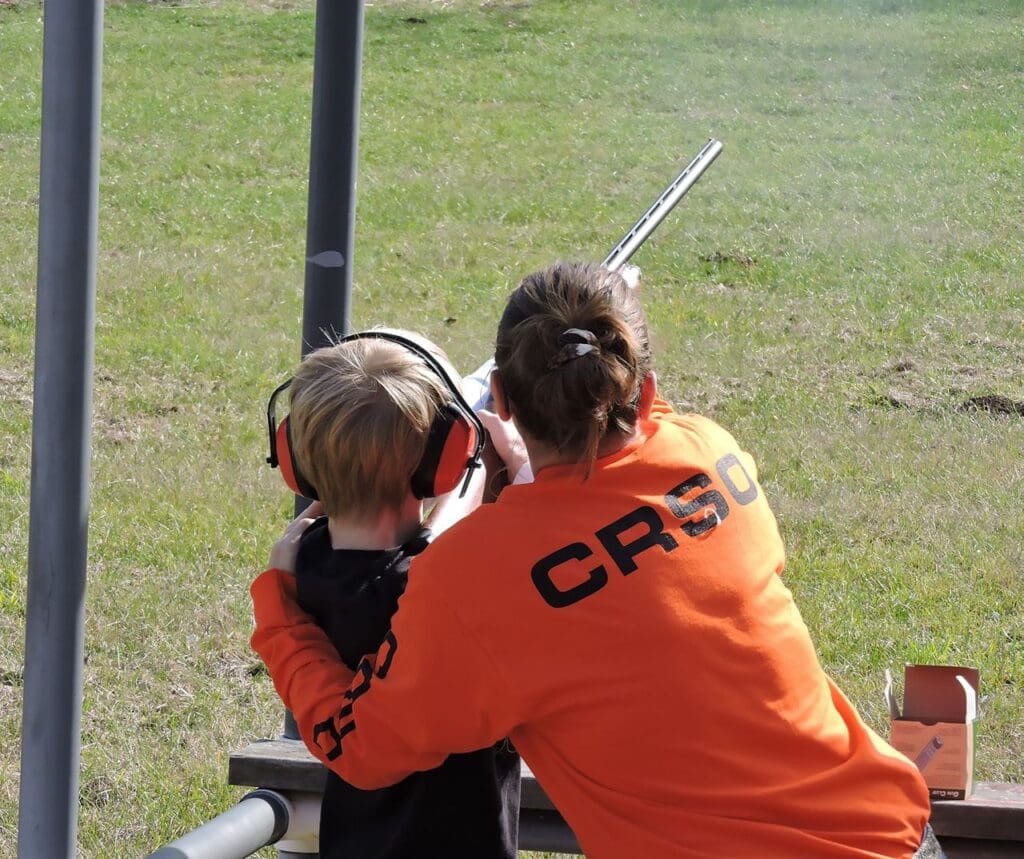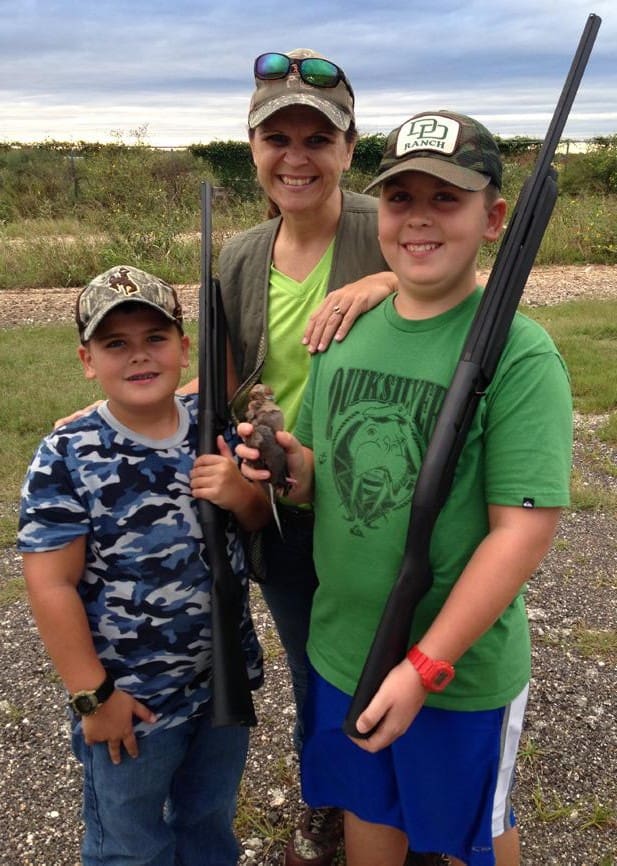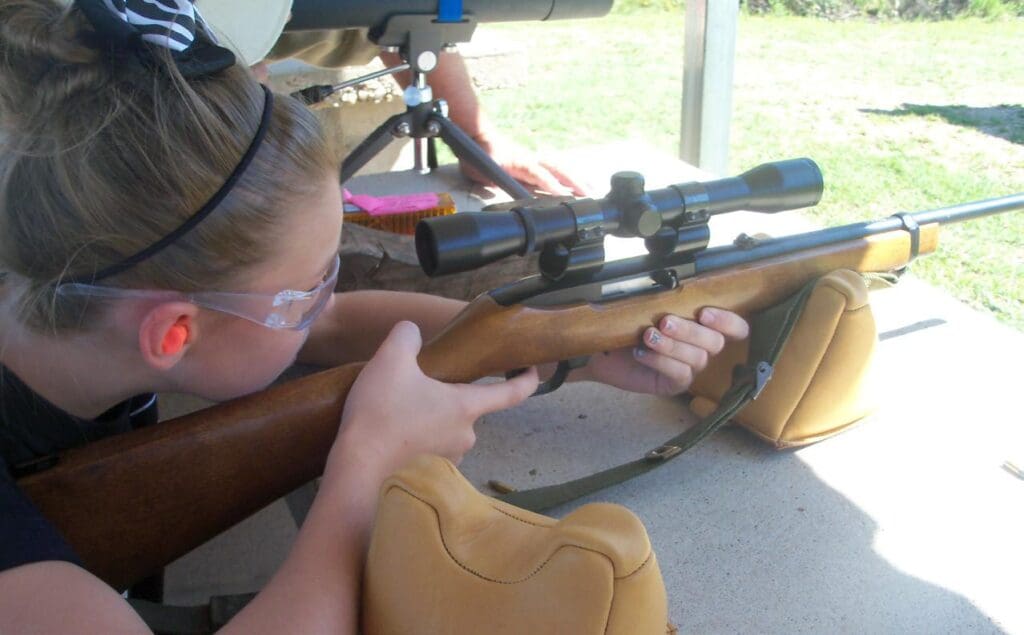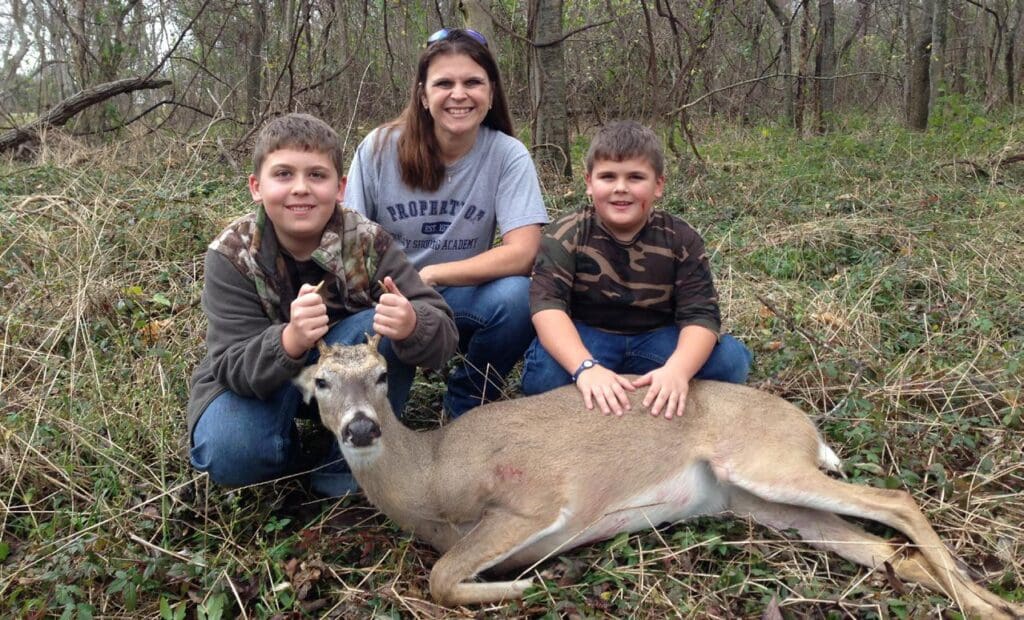WOMEN MAKE THE BEST HUNTING MENTORS

THE OFFICIAL PUBLICATION OF HOUSTON SAFARI CLUB FOUNDATION • CONVENTION 2025

STORY AND PHOTOS BY HEIDI LYN RAO

As women, we have great responsibilities. Women usually take on the role of teaching our sons, daughters, grandchildren, nieces, and nephews. It is only natural that we also take on the
role of hunting mentors. As hunters, we have a duty to introduce others, especially the youth, to our sport and ensure that our hunting heritage continues with future generations.
By introducing new stakeholders to hunting, we are investing in the future of our sport. We are creating a future voting base with the young boys and girls we teach. Additionally, by mentoring our youth, we have the unique opportunity to intercept and correct the misinformation being disseminated by the liberal anti-hunting factions. It should be our goal to help correct the misinformation being taught to our youth so they can be educated and spread the truth about hunting to their peers.
Anytime we can introduce others to hunting is a good thing. There are many benefits to increasing the number of hunters. First, it is hunters who pay for conservation. In 1937, the Pittman-Robertson Act was signed into law, imposing an 11% federal excise tax on firearms, ammunition, and archery equipment to be redistributed back to the states and earmarked for wildlife restoration and conservation projects. Today, hunters pay more than $1.6 billion a year for conservation programs. These dollars generated
are the reason we have an abundance of wildlife numbers today, thanks to the vision of hunters so many years ago.
There is also a benefit to 2nd Amendment organizations. Many new hunters join organizations such as the National Rifle Association (NRA) and their state and local groups to ensure that their rights are protected. Hopefully, these new voters will safeguard these same rights for their children, grandchildren, and future generations. Lastly, many new hunters join national and local hunting clubs. Organizations such as the Houston Safari Club Foundation spend a lot of money on conservation efforts through memberships and fundraising efforts.
Every hunter should make it his or her goal to mentor and recruit as many new hunters as they can reach. The key to mentoring is that it is done correctly. There is a right way and a wrong way to mentoring and recruiting. Unfortunately, many individuals and organizations make the same mistakes when mentoring new hunters. Despite best intentions, hunts are often poorly planned within a restrictive timeframe, or the age and skill of the participant are not taken into consideration.
Mentored hunts that are poorly conducted can have the opposite effect intended and can quickly turn an individual away from hunting. If we are going to take the time to seek out, recruit, and mentor new hunters, it must be done correctly. Sometimes, an organization gets complacent, and a youth hunting program turns into a “Feel-Good” program for the organization as they pump as many kids through it as quickly as they can. Mentoring new hunters is not a “numbers game” with the end goal of seeing who or which organization “introduces” the most first-time individuals to hunting. A mentor is a teacher. He or she is there to teach an individual how to hunt safely and correctly while answering questions with accurate and proper knowledge. This is not an opportunity for the mentor to show off his or her skills or brag about their own personal experiences. All this does is make the new hunter try to measure up to the mentor instead of focusing on the experience of their own hunt.
To properly mentor a new hunter, the mentor must be properly trained. Proper mentorship takes time, investment, and commitment. This training can be formal or informal. Examples of informal ways of getting trained include internet searches on the flora and fauna of the area, contacting your state wildlife conservation agency, and talking with the Hunting Department and, specifically, the Hunter.

Above: Heidi teaching a young lady rifle fundamentals before a youth hunt.
Below: Heidi guiding her 2 sons (Dominic (left) and Matthew (right) on a deer hunt.

Education Program for ideas introducing individuals to hunting and techniques for mentors. Some formal training opportunities include becoming a certified National Rifle Association (NRA) Rifle, Pistol, and/or Shotgun Instructor, which can help mentors introduce new hunters and teach the proper shooting fundamentals and techniques for success. There are many wildlife classes and workshops offered through state conservation agencies available to the public. These opportunities increase knowledge of hunting topics, wildlife species, laws, and a variety of hunting methods, which ultimately benefit mentors.
There are three groups that have hunting mentors who reach new hunters. These three groups are (1) Personal Relationship Mentors, (2) Organizational Guides and Mentors, and (3) Landowners or their Agents. It is very important that all these individuals understand their roles and limitations as hunting mentors.

PERSONAL RELATIONSHIP MENTORS
Parents, other relatives, and close friends are mentors formed by blood or personal relationships. These personal relationship mentors are often responsible for purchasing the new hunter’s first firearm or at least advising him or her on their purchase. For example, a parent will usually purchase their child their first deer rifle, or a close friend may help a buddy pick out a rifle at the local sporting goods store. It is human nature to look for bargains, but quality rifles that will last a lifetime and are known or dependability and accuracy seldom come in combo packages. As a mentor, make sure your new hunter’s first firearm is of good quality. While it is natural that hunters may experience doubts or concerns about their first hunt, their main piece of equipment should not be one of them.
Just as important as the rifle is the optics, or scope, which connects the shooter’s eye, bullet, and target. How well a scope performs is crucial, though a quality scope can cost as much, if not more, than the rifle. The quality of the glass determines the clarity of the image, and prices will reflect that.
As far as objective lenses go, pick the largest one you can. This will let in more light, which translates into a better sight picture when hunting in low-light conditions. Game species are oftentimes most active at sunup and sunset. A new hunter needs all the help he or she can get in target identification, acquisition, and shot placement.
Lastly, and equally important as the rifle and scope, is the ammunition. The most common problem seen while on youth hunts that have resulted in wounded or lost deer is the use of cheap and inexpensive ammunition. Parents, other mentors, organizations, and their guides may have adequate firearms and optics, but many purchase the cheapest ammunition they can find. There are several reasons for this. First, many mentors do not understand the difference between different types of bullets and how they perform. Look for maximum expansion and penetration, even at an added cost. All the rifle does is deliver the bullet to the target. You want the bullet to do its job when it gets there. Second, some organizations buy in bulk and purchase cheap ammunition for cost savings.
Before the hunt, it is the responsibility of a good personal relationship mentor to take the new hunter to the range as many times as necessary to sight in the rifle and ensure the hunter is comfortable with the firearm. Range time is not a one-and-done-time event. Practice with the same ammunition you will use on the hunt. With shotguns, frequently visit a range until the hunter is consistently breaking clay birds while shooting trap skeet, or sporting clays. When practicing at the range, try to shoot in conditions similar to when you might be hunting. For example, if you are mentoring a deer hunt, your hunter may be shooting at sunrise or late evening before sunset, when it is usually cooler and damper. These conditions can affect the flight of the bullet as well as the shooter. Visiting an outdoor range early in the morning or when the sun is setting will better prepare the hunter, rather than taking them in the middle of the day when the sun is bright and the day is warmer.
Put yourself in their shoes and remember how you felt on your first hunt. Hopefully, you have done your duty and helped them pick out a good rifle, quality scope, and proper ammunition and brought them to the range several times ahead of hunting season. You have introduced them to their first hunt, positioned them on a game animal, and NOW, the rest of the moment is up to them!
ORGANIZATIONAL GUIDES AND MENTORS
Organizational guides and their mentors are members of hunting or conservation clubs, state wildlife agencies, or youth hunting organizations, many of whom are volunteering their time to do so. If an organization commits to recruiting new hunters and has established youth and/or adult hunting programs, the organization should also commit to purchasing the appropriate equipment and gear, including quality ammunition. Organizations should also vet their members who serve as guides and mentors. These individuals need to undergo a criminal history background check and believe in the mission of the organization.
It is highly recommended that these guides and mentors become certified NRA firearm instructors to learn the proper shooting fundamentals and techniques and how to be effective communicators as they teach new hunters and shooters. It is also advisable they become a state-certified Hunter Education Instructor to properly educate those they are mentoring about wildlife conservation, habitat, hunting rules, game laws, and regulations.
As women, we should take a leading role in these opportunities. Ladies need to volunteer and become mentors in an organization’s youth hunting program. More and more young girls are showing an interest in hunting and shooting sports. It is of great benefit to have women as role models for these young girls to look up to and relate to.
If possible, an organization’s guide or mentor should be assigned to a hunter long before a hunt is scheduled. It takes planning to match mentors to hunters who live close to each other. This enables the mentor to accompany the hunter and his or her parents to a range and begin a relationship so the hunter feels comfortable asking questions and calming any pre-hunt anxiety. There is a big benefit to the mentor taking the hunter to the range again, just prior to the hunt, verifying the rifle is sighted in and that the hunter can hit the target. Once the hunt begins, the mentor and hunter should already know each other and be comfortable working together since a connection has been made. After the hunt, the mentor should be available for guidance on processing, meat preparation, and cooking or any other questions the hunter may have.

LANDOWNERS CAN BE MENTORS TOO
Today, there is a growing number of women who are landowners, especially in Texas. Landowners and their agents are private parties who oftentimes allow individuals or program coordinators to conduct hunts for beginners on their property. Many landowners look forward to hosting first-time hunters, especially youth hunts. Ladies-only hunts are becoming more popular, and it is an added benefit to have women guiding and mentoring these hunters. Landowners frequently partner with hunting organizations or state conservation agencies.
Landowners and their agents know their land and the game animals that roam on the property. Sometimes, if a first-time hunter does not have any luck, the landowner or agent can step in and help the hunter find certain animals. It is all about the first taste of success. We want these new hunters to reap the rewards for their hard work preparing for this hunt while at the same time letting them know that one is not always successful. There can always be another trip to learn the lesson of coming up empty-handed, but not on this hunt! Many landowners will make it their weekend’s mission to locate the perfect game
animal on property and encourage the new hunter to make that perfect shot!
One thing that really makes an impression on first-time hunters is when the landowner participates and interacts with the hunters. This makes an impact on the hunters, especially when the landowner listens to their experiences and shares stories and memories while on his or her property. Most first-time and novice hunters remember those hunts in which the landowner was involved.
KNOW YOUR LIMITATIONS
Limitations are not necessarily a bad thing. Depending on the individual, limitations can be opportunities to learn new skills and increase knowledge. The problem occurs when a mentor does not recognize his or her limited, or in some cases, nonexistent, skills and/or knowledge. A mentor can have all the good intentions in the world, all the desire to promote the heritage of hunting or help a youngster take his or her first deer, but if the mentor has not properly prepared, the mentor can actually turn a new hunter
away from hunting or in a worst-case scenario, turn this youngster into an anti-hunter!
One of the most common and most easily recognizable limitations that many mentors have is the ability to sit quietly in a blind, stand, or other type of concealment for extended periods. This is a problem that is frequently attributed to new hunters, especially young hunters. Often, it is the mentors themselves who cannot sit for extended periods. Some examples include not whispering while in a blind, taking phone calls and/or messaging while “mentoring,” not paying attention to the details of the hunt, opening candy and snacks by loudly crinkling the wrappers, and even taking numerous “stretch breaks” outside of the blind. As a result, a new hunter may feel that their hunt was not taken seriously, and these events may ultimately turn them away from hunting altogether.
Of course, these examples are not representative of most mentors. Many can sit motionless for hours, riveted, waiting for a “trophy” to emerge and present itself with the perfect shot for a new hunter. If, as a mentor, you recognize that you cannot sit still and quietly for extended periods of time, there are other
duties during a mentored hunt that can be done that do not include sitting in a stand. Organizations need to recognize which of their members cannot sit for extended periods and give them other duties. Leaders can determine this by having the new hunters fill out surveys at the end of the hunt or by simply keeping a record of success rates of their guides and mentors.
This limitation could turn out to be a benefit to a mentor who is self-aware and puts the program and
the new hunter first. This could open the opportunity for the mentor to try new tasks that contribute
to making the hunt a success. For example, a mentor who cannot sit for extended periods may discover that he or she is a great camp cook, an effective firearms instructor, or knowledgeable about wildlife identification. Speaking of firearms, another limitation that many mentors refuse to recognize as problematic is the proper handling of firearms and techniques for success. In an ideal scenario, a mentor should be available well before the scheduled hunt to frequently practice at the range, so confidence is gained and proficiency is increased. Both benefits fall back on the instruction by the mentor. There is a right way and a wrong way to teach someone how to shoot a firearm. There is also a right way and a wrong way to shoot a firearm. If a mentor teaches a new hunter bad techniques, the new hunter is going
to become frustrated at the range when they are not successful at the target. This frustration will follow him or her to the hunt and affect their confidence.
It is a mentor’s responsibility to get credible and reputable firearms training in safety and proper techniques. One of the best places to get firearms training is from an NRA firearms course. Courses are available in Rifle, Pistol, Shotgun, and Muzzleloading. Organizations that promote mentoring programs, youth hunting programs, first-time hunter programs, ladies’ hunts, etc., should seek out and recruit certified NRA firearms instructors to assist in training.
Another common limitation some mentors fail to recognize or refuse to admit is that they do not know everything there is to know about hunting. In other words, they refuse to admit that they are not experts on all things hunting! If you are an expert, GREAT. If you want to share that knowledge, GREAT. If you educate the masses, including other mentors and new hunters alike, GREAT. But if you are giving bad information, NOT SO GREAT!
There is no shortage of camp “Know-It-Alls” in the world of hunting. In the best-case scenario, this individual is good to have around for comic relief, but most of the time, this individual is just an annoyance. In the worst-case scenario, misinformation could be spread to new hunters, and they leave the hunt with bad information, techniques, and/or opinions of seasoned hunters.
Next time you attend any form of a mentored hunt, sit back and observe the interactions between mentors and participants. Often it will be apparent that the new hunter did his or her homework and researched the techniques and methods associated with the hunt. If a mentor is talking to the new hunter in terms like he or she found during the research, you will see expressions of agreement. If the mentor is talking about “unconventional” methods, you will usually see looks of confusion.

There is an abundance of classes, workshops, and seminars available from the various state and federal wildlife agencies as well as various hunting organizations to be misinformed. Many of these classes and workshops are free to attend or have a very minimal fee. Organizations should ensure that all their members are educated in the species that they are introducing new hunters to and the types of firearms that will be used to do so. This is the hunt they will remember for a lifetime.
WOMEN MAKE GREAT MENTORS
Women are the fastest-growing demographic in hunting. More women have shown an interest in hunting, which has led to increased participation. The rise of female participation in hunting has created a supportive network of like-minded individuals who all have a passion to continue our hunting
heritage. Hunting brings people together while strengthening bonds through shared experiences. Younger generations, which include millennials and Gen Z, are also showing an increased
interest in hunting.
Since women are the largest registered voting base in the United States, it makes sense for these empowered and confident huntresses to answer the call to mentor our next generation of young hunters and conservationists. By teaching proper knowledge, skills, and facts about hunting, these new hunters will grow up conservation-minded and better educated about firearm safety, marksmanship, wildlife, and the natural world around them. These are our future voters. It is our responsibility to teach them so they grow up as informed voters, especially on issues related to hunting and firearms.
To capture our future generations and to make a lasting hunter, it takes a mentor who is willing to ensure the student is properly prepared before the hunt, taken care of during the hunt, and followed up with after the hunt. Are you on board to be the best hunting mentor? ★
